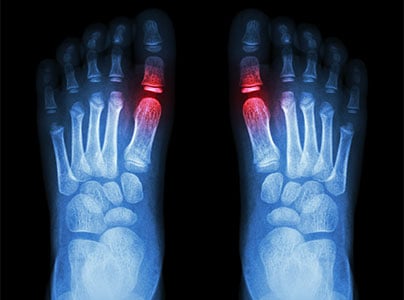Recipes
Gout is a metabolic disease involving sharp crystals of uric acid (urate) forming in joints or other areas of the body. Gouty attacks come on episodically, causing joint swelling and pain. Pseudogout is a similar condition which involves calcium pyrophosphate crystals.

Gout can affect both women and men but is much more common in men and overall affects approximately 4% of the U.S. population.1 Signs and symptoms of a gouty attack may include:
How do you know if you are going to get a gouty attack? Here are some risk factors to be aware of:
Often when someone gets a gouty attack, there are multiple factors working together to reach a threshold. Overwhelmingly, the lifestyle factors that are modifiable (diet, water intake, alcohol use, sweetened beverage use) are by far the strongest factors contributing to gout risk. A Nutritarian lifestyle is a sure way of reducing this risk automatically, even in those with a predisposition to the disease.
Review secondary risk factors with your doctor, such as medications and diseases.
The following are sample questions from the Ask the Doctor Community Platinum and higher members can post their health questions directly to Dr. Fuhrman. (All members can browse questions and answers.)
I’ve been on and off a Nutritarian diet for a while now. I have chronic gout and my uric acid levels are 10.3. My rheumatologist wants me to begin Allopurinol. How quickly can I expect my uric acid levels to drop with a strict Nutritarian diet WITHOUT the medicine? Should I take Allopurinol AND do the diet, or will that cause a severe drop resulting in worsening attacks?
I usually wait about a month on a Nutritarian diet before discontinuing the Allopurinol on patients requiring it in the past. In your case, you may not even have to start the medicine if you really stick with a Nutritarian diet. Doing both the medication and the diet won’t necessarily hurt you, but all medications have their risks, and you likely will see dramatic benefits in a week or two. So, if you eliminate all animal products at this point and follow a Nutritarian diet strictly, your uric acid levels will be dramatically lower soon. Drink a full glass of water between each meal too. Check your uric acid level again next month, and let’s see how it improves and how you feel.
I would like to know what I can do to treat gout.
Avoid animal products and all processed foods and oils. Limit spinach, asparagus, and mushrooms to two to four oz./day. Limit fruits higher in fructose (apple, grapes, melon, pear, and dried fruit). Limit beans to one cup/day until the swelling and pain are gone. Continue to avoid animal products until you’re better, then limit to six oz./week. Stay hydrated. Drink four oz. of tart cherry juice two to three times per day. It has been shown to reduce inflammation and pain related to gout. Get lean and eliminate belly fat.